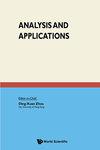正则极限、解析延拓与有限部分积分
IF 2
2区 数学
Q1 MATHEMATICS
引用次数: 4
摘要
. 有限部分积分是一种用发散积分的有限部分来计算收敛积分的新方法[E]。A. Galapon, Proc. R. Soc。[j].农业工程学报,2016,37(4):20160567(2017)。在原点具有对数增长的函数的Stieltjes变换的有限部分积分的背景下,当Mellin积分扩展到其可解析性范围之外时,建立了Mellin变换的解析延拓与结果发散积分的有限部分之间的关系。证明了解析延拓与有限部分积分在解析延拓的正则点重合。为了在解析延拓的孤立奇点处建立两者之间的联系,引入正则化极限的概念来代替通常的柯西极限概念,当后者导致除零时。然后证明了解析延拓在孤立奇异点处的正则化极限等于奇异点处的有限部分积分。该处理给出了Stieltjes变换在有限部分积分中的精确计算,并给出了在原点存在任意对数奇点时,对于参数的任意小值,该变换的主导渐近性质。本文章由计算机程序翻译,如有差异,请以英文原文为准。
Regularized Limit, Analytic Continuation and Finite-part Integration
. Finite-part integration is a recent method of evaluating a convergent integral in terms of the finite-parts of divergent integrals deliberately in- duced from the convergent integral itself [E. A. Galapon, Proc. R. Soc., A 473, 20160567 (2017)]. Within the context of finite-part integration of the Stieltjes transform of functions with logarithmic growths at the origin, the relationship is established between the analytic continuation of the Mellin transform and the finite-part of the resulting divergent integral when the Mellin integral is extended beyond its strip of analyticity. It is settled that the analytic continu- ation and the finite-part integral coincide at the regular points of the analytic continuation. To establish the connection between the two at the isolated singularities of the analytic continuation, the concept of regularized limit is introduced to replace the usual concept of limit due to Cauchy when the later leads to a division by zero. It is then shown that the regularized limit of the analytic continuation at its isolated singularities equals the finite-part integrals at the singularities themselves. The treatment gives the exact evaluation of the Stieltjes transform in terms of finite-part integrals and yields the domi- nant asymptotic behavior of the transform for arbitrarily small values of the parameter in the presence of arbitrary logarithmic singularities at the origin.
求助全文
通过发布文献求助,成功后即可免费获取论文全文。
去求助
来源期刊
CiteScore
3.90
自引率
4.50%
发文量
29
审稿时长
>12 weeks
期刊介绍:
Analysis and Applications publishes high quality mathematical papers that treat those parts of analysis which have direct or potential applications to the physical and biological sciences and engineering. Some of the topics from analysis include approximation theory, asymptotic analysis, calculus of variations, integral equations, integral transforms, ordinary and partial differential equations, delay differential equations, and perturbation methods. The primary aim of the journal is to encourage the development of new techniques and results in applied analysis.

 求助内容:
求助内容: 应助结果提醒方式:
应助结果提醒方式:


